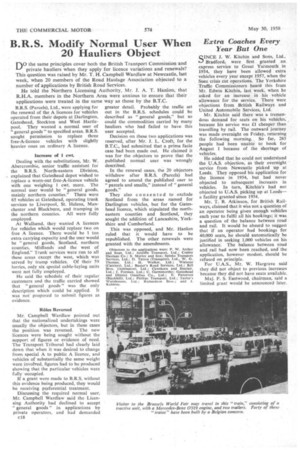B.R.S. Modify Normal User When 20 Hauliers Object
Page 56

If you've noticed an error in this article please click here to report it so we can fix it.
nO the same principles cover both the British Transport Commission and private hauliers when they apply for licence variations and renewals? This question was raised by Mr. T. H. Campbell Wardlaw at Newcastle, last week, when 20 members of the Road Haulage Association objected to a number of applications by British Road Services.
He told the Northern Licensing Authority, Mr. J. A. T. Hanlon, that R.H.A. members in the Northern Area were anxious to ensure that their applications were treated in the same way as those by the B.T.C.
B.R.S. (Parcels), Ltd., were applying for the renewal of the A licences for vehicles operated from their depots at Darlington, Gateshead, Stockton and West Hartlepool. They wanted a normal user of "general goods" to specified areas. B.R.S. sought permission to replace three free-A-licence vehicles with slightly heavier ones on ordinary A licence.
Increase of 1 cwt.
Dealing with the substitutions, Mr. W. Abercrombie, senior traffic assistant for the B.R.S. North-eastern Division, explained that Gateshead depot wished to replace a worn-out free-A-licence vehicle with one weighing 1 cwt. more. The normal user would. be "general goods, mainly northern counties." There were 65 vehicles at Gateshead, operating trunk services to Liverpool, St. Helens, Manchester and Blackburn, and tramping in the northern counties. All were fully employed.
At Wallsend, they wanted A licences for vehicles which would replace two on free A licence. There would be 1 ton extra carrying capacity and the user would be "general goods, Scotland, northern counties, Midlands and the west of England." Trunk services were run to all these areas except the west, which was served by tramp vehicles. Of their 59 lorries, only six special cable-laying units were not fully employed.
He said the schedule of their regular customers and the traffic carried showed that "general goods" was the only description which could be applied. It was not' proposed to submit figures as evidence.
Roles Reversed
Mr. Campbell Wardlaw pointed out that the nationalized undertakings were usually the objectors, but in these cases the position was reversed. The new licences were being sought without the support of figures or evidence of need. The Transport Tribunal had clearly laid down that when it was desired to change from special A to public A licence, and vehicles of substantially the same weight were involved, figures had to be produced showing that the particular vehicles were fully occupied.
If a grant were made to B.R.S. without this evidence being produced, they would be receiving preferential treatment.
Discussing the required normal user, Mr. Campbell Wardlaw said the Licensing Authority had declined to accept "general goods" in applications by private operators, and had demanded cl 8
greater detail. Probably the traffic set out in the B.R.S. schedules could be described as "general goods," but so could the commodities carried by many hauliers who had failed to have this user accepted.
Decision on these two applications was reserved, after Mr. I. L. Croft, for the B.T.C., had submitted that a prima facie case had been made out. He claimed it was for the objectors to prove that the published normal user was wrongly described.
In the renewal cases, the 20 objectors withdrew after B.R.S. (Parcels) had agreed to amend the published user to "parcels and smalls," instead of "general goods."
They also c on s en ted to exclude Scotland from the areas named for Darlington vehicles, but for the Gateshead licence, which stipulated the northeastern counties and Scotland, they sought the addition of Lancashire, Yorkshire and Cumberland.
This was opposed, and Mr. Hanlon ruled that it would have to be republished. The other renewals were granted with the amendments.




























































































































